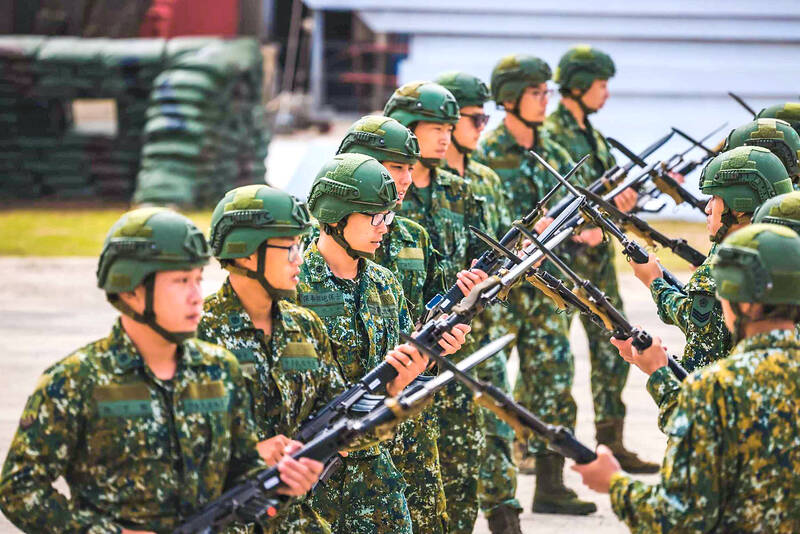The army is in the process of updating its decades-old traditional bayonet training with a program focusing on hand-to-hand combat to equip soldiers with more practical skills critical for survival on the battlefield, a senior military official said yesterday.
Ministry of National Defense (MND) Major General Liu Sheen-mo (劉慎謨), who is in charge of training, said military instructors at the Army Infantry Training Command’s Sports Science Center are studying the US military’s hand-to-hand closed-quarters combat program and will use it as a base when updating Taiwan’s decades-old bayonet program.
The ultimate goal is to come up with a new training program that would enable a soldier to use handheld weapons or a knife to take down a rival, which should significantly increase the soldier’s chances of survival, Liu told reporters during a media briefing.

Photo courtesy of the Penghu Defense Command via CNA
Liu made the comments in response to questions about the army’s replacement for the military’s traditional bayonet training that had been in place since 1965.
The new defense head last week pledged that it would be updated.
Speaking during a legislative session on Thursday last week, Minister of National Defense Wellington Koo (顧立雄) said that traditional bayonet training is ceremonial and more of a formality with very little practical use in close combat.
The decision to scrap the outdated program was made to allow troops to focus more on practical training sessions and enhance their defense capabilities, Koo said.
The traditional program was established in 1965 by combining US and Japanese styles of bayonet charge practices, but over the years, experts have criticized its practical use in close combat on the battlefield.
Koo, the nation’s first civilian defense head in a decade, has also announced that other decades-old traditions in the armed forces would be scrapped. This includes goose-stepping and overseas travel restrictions for military personnel.

EVA Air is prohibiting the use of portable chargers on board all flights starting from Saturday, while China Airlines is advising passengers not to use them, following the lead of South Korean airlines. Current regulations prohibit portable chargers and lithium batteries from check-in luggage and require them to be properly packed in carry-on baggage, EVA Air said. To improve onboard safety, portable chargers and spare lithium batteries would be prohibited from use on all fights starting on Saturday, it said. Passengers are advised to fully charge electronic devices before boarding and use the AC and USB charging outlets at their seat, it said. South

Hong Kong-based American singer-songwriter Khalil Fong (方大同) has passed away at the age of 41, Fong’s record label confirmed yesterday. “With unwavering optimism in the face of a relentless illness for five years, Khalil Fong gently and gracefully bid farewell to this world on the morning of February 21, 2025, stepping into the next realm of existence to carry forward his purpose and dreams,” Fu Music wrote on the company’s official Facebook page. “The music and graphic novels he gifted to the world remain an eternal testament to his luminous spirit, a timeless treasure for generations to come,” it said. Although Fong’s

WAR SIMULATION: The developers of the board game ‘2045’ consulted experts and analysts, and made maps based on real-life Chinese People’s Liberation Army exercises To stop invading Chinese forces seizing Taiwan, board gamer Ruth Zhong chooses the nuclear option: Dropping an atomic bomb on Taipei to secure the nation’s freedom and her victory. The Taiwanese board game 2045 is a zero-sum contest of military strategy and individual self-interest that puts players on the front lines of a simulated Chinese attack. Their battlefield game tactics would determine the theoretical future of Taiwan, which in the real world faces the constant threat of a Chinese invasion. “The most interesting part of this game is that you have to make continuous decisions based on the evolving situation,

China’s military buildup in the southern portion of the first island chain poses a serious threat to Taiwan’s liquefied natural gas (LNG) supply, a defense analyst warned. Writing in a bulletin on the National Defense and Security Research’s Web site on Thursday, Huang Tsung-ting (黃宗鼎) said that China might choke off Taiwan’s energy supply without it. Beginning last year, China entrenched its position in the southern region of the first island chain, often with Russia’s active support, he said. In May of the same year, a Chinese People’s Liberation Army Navy (PLAN) force consisting of a Type 054A destroyer, Type 055 destroyer,